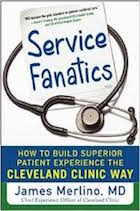 Editor’s Note: In our continuing series of leadership interviews, Stewart Gandolf, CEO of Healthcare Success talks with Dr. James Merlino who recently assumed a position with Press Ganey as president and chief medical officer of the strategic consulting division. At the time of this interview Dr.
Editor’s Note: In our continuing series of leadership interviews, Stewart Gandolf, CEO of Healthcare Success talks with Dr. James Merlino who recently assumed a position with Press Ganey as president and chief medical officer of the strategic consulting division. At the time of this interview Dr. Editor’s Note: In our continuing series of leadership interviews, Stewart Gandolf, CEO of Healthcare Success talks with Dr. James Merlino who recently assumed a position with Press Ganey as president and chief medical officer of the strategic consulting division. At the time of this interview Dr. Merlino was the Chief Experience Officer and Associate Chief of Staff for the Cleveland Clinic.
Editor’s Note: In our continuing series of leadership interviews, Stewart Gandolf, CEO of Healthcare Success talks with Dr. James Merlino who recently assumed a position with Press Ganey as president and chief medical officer of the strategic consulting division. At the time of this interview Dr. Merlino was the Chief Experience Officer and Associate Chief of Staff for the Cleveland Clinic.
 Editor’s Note: In our continuing series of leadership interviews, Stewart Gandolf, CEO of Healthcare Success talks with Dr. James Merlino who recently assumed a position with Press Ganey as president and chief medical officer of the strategic consulting division. At the time of this interview Dr. Merlino was the Chief Experience Officer and Associate Chief of Staff for the Cleveland Clinic.
Editor’s Note: In our continuing series of leadership interviews, Stewart Gandolf, CEO of Healthcare Success talks with Dr. James Merlino who recently assumed a position with Press Ganey as president and chief medical officer of the strategic consulting division. At the time of this interview Dr. Merlino was the Chief Experience Officer and Associate Chief of Staff for the Cleveland Clinic.Driving patient experience is a primary consideration in healthcare delivery today. People are customers before they become patients and every organization and practice is making patient experience a top priority. There’s no better example of how difficult this change can be—and what’s required to achieve it—than the story Dr. James Merlino tells in his new book: Service Fanatics: How to Build Superior Patient Experience the Cleveland Clinic Way.
Stewart Gandolf, CEO of Healthcare Success, talked with Dr. Merlino about the challenges and successes of a patient experience mandate and cultural change in an organization.
Service Fanatics: Required Reading for Superior Patient Experience
Cleveland Clinic has long been known for its positive clinical reputation, but ten years ago, it was not highly regarded for how patients experienced care. The changes that have lead to the organization’s excellence in patient experience and other discussion points in today’s podcast include:
- Changing culture is extremely difficult in any size organization. And creating a major cultural shift in a large health system such as the Cleveland Clinic was especially challenging. “Culture eats strategy for lunch every day,” Dr. Merlino observed. “In healthcare it’s critical to recognize that if you’re going to be successful in driving improvements, such as how you deliver safety, how you ensure high quality outcomes, how you do that in a patient- and family-centered environment…you have to recognize that it is about the people. And the people need to be aligned around the mission of the organization.”
- The book is, in many ways, an open, honest and revealing look at the positive and the negative in bringing about this significant turnaround. These insights are of value to hospitals, medical practices and healthcare providers as well as any business. “A lot of ‘improvement papers’ only deal with what works. And often we forget about what didn’t work. What I tried to do [with this book] is to lift up the hood and show some dirty laundry in order to talk about the challenges that we faced as we tried to move forward.”
- One of the most significant challenges in the process of improvement are the doctors themselves. In the case of the Cleveland Clinic, this group was a barrier to change. “Doctors are a double-edged sword in healthcare,” Dr. Merlino told us. “Number One, we can’t have healthcare without doctors. And Number Two, you can’t improve healthcare without their engagement. And sometimes they can be the biggest barrier to improvement.”
- “Healthcare is no longer an individual sport. It is a team sport of highly qualified professionals—some are doctors, some are nurses and other healthcare professionals—who come together to deliver what we call healthcare today. And while doctors are very important, they are not the most important—everyone’s important. So people need to realize—and doctors need to realize—that it is a team sport.”
We think this book should be required reading for healthcare providers. And for the benefit of individual practitioners, group practices and large and small hospitals, professionals and organizational leaders need to make patient experience a top priority. Any organization that is trying to drive and sustain change needs to set it as an overarching strategic priority.







